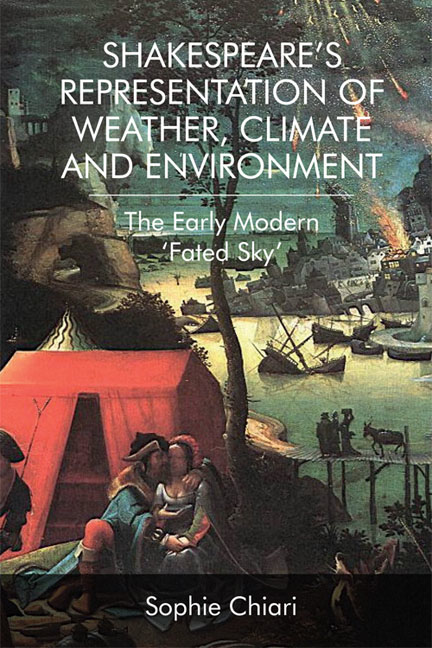Book contents
- Frontmatter
- Contents
- Illustrations
- Acknowledgements
- Textual Note
- Introduction
- 1 ‘We see / The seasons alter’: Climate Change in A Midsummer Night's Dream
- 2 ‘[T]he fire is grown too hot!’: Romeo and Juliet and the Dog Days
- 3 ‘Winter and rough weather’: Arden's Sterile Climate
- 4 Othello: Shakespeare's À bout de souffle
- 5 ‘The pelting of [a] pitiless storm’: Thunder and Lightning in King Lear
- 6 Clime and Slime in Anthony and Cleopatra
- 7 The I/Eye of the Storm: Prospero's Tempest
- Conclusion: ‘Under heaven's eye’
- Bibliography
- Index
2 - ‘[T]he fire is grown too hot!’: Romeo and Juliet and the Dog Days
- Frontmatter
- Contents
- Illustrations
- Acknowledgements
- Textual Note
- Introduction
- 1 ‘We see / The seasons alter’: Climate Change in A Midsummer Night's Dream
- 2 ‘[T]he fire is grown too hot!’: Romeo and Juliet and the Dog Days
- 3 ‘Winter and rough weather’: Arden's Sterile Climate
- 4 Othello: Shakespeare's À bout de souffle
- 5 ‘The pelting of [a] pitiless storm’: Thunder and Lightning in King Lear
- 6 Clime and Slime in Anthony and Cleopatra
- 7 The I/Eye of the Storm: Prospero's Tempest
- Conclusion: ‘Under heaven's eye’
- Bibliography
- Index
Summary
These violent delights have violent ends
And in their triumph die like fi re and powder,
Which as they kiss consume. (2.5.9–11)
In A Midsummer Night's Dream, the playwright blatantly questions the traditional ideas about climate by showing how free will and ill omens may sometimes combine and how far humankind may be blamed for the various climatic disasters plaguing the lives of peasants as well as of the population as a whole. Romeo and Juliet, often considered as the Dream's companion piece, develops its own approach to climate, one that incorporates traditional calendar references as well as astrological beliefs. As Carla Mazzio puts it, ‘[i]t is fascinating to reflect upon Romeo and Juliet […] as a crushing tragedy of astrological determinism at a time in England when predictive astrology was being seriously challenged if not denounced outright.’ That the play lends itself to such astrological readings seems confirmed by Paris's remark that ‘Venus smiles not in a house of tears’ (4.1.8), a phrase which alludes both to his ill-timed marriage with Juliet and to the particular influence of the planet Venus in the zodiac. This does say something about the pre-eminence of the ‘fated sky’ in Shakespeare's first love tragedy, all the more so as the line comes after Romeo's passionate speech about Juliet's eyes, which he compares to ‘[t]wo of the fairest stars in all the heaven’ (2.1.57).
The astrological and climatic determinism of the play works in such a way that its various incidents first seem to take place on a vast celestial stage before they even unfold on the earth. Consequently, Juliet's life is as dependent on Verona's ‘fated sky’ as it is on the calendar of its earthly events. If we accept the idea that the seasons are the ‘climatic presentation of the passage of time’, the month of July here takes on a particular significance through images that associate July with Juliet and underline the stifling summer heat which paralyses the city of Verona. Shakespeare's plot emphasises courte durée in opposition to the longue durée prevailing in late romances like The Winter's Tale, so that, in this early tragedy, summer appears as a climactic time of the year.
- Type
- Chapter
- Information
- Shakespeare's Representation of Weather, Climate and EnvironmentThe Early Modern ‘Fated Sky’, pp. 57 - 79Publisher: Edinburgh University PressPrint publication year: 2017

